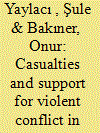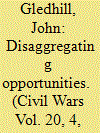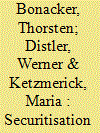|
|
|
Sort Order |
|
|
|
Items / Page
|
|
|
|
|
|
|
| Srl | Item |
| 1 |
ID:
163332


|
|
|
|
|
| Summary/Abstract |
The casualty effect is a widely studied explanation of public support for war in the context of overseas military operations, yet work on the effect of casualties on support for intrastate war is scant. This paper examines the impact of local casualties on support for using military action as a conflict resolution method for intrastate war, using data from two public opinion surveys, collected in Turkey in the absence and presence of large-scale violence, and an original dataset for the local casualties. We find that local-level casualties on average increase the support for military action in ethnic wars.
|
|
|
|
|
|
|
|
|
|
|
|
|
|
|
|
| 2 |
ID:
163329


|
|
|
|
|
| Summary/Abstract |
ecent research has employed estimates of media exposure to explore the relationship between information disseminated ‘from above’ and political violence. I argue that those methods involve a potential pitfall, i.e., the possibility that the variable that they measure, media availability, is an inadequate proxy for media consumption, the actual variable of interest. I further argue that researchers often cannot be confident that that proxy is a valid one unless they have a deep qualitative understanding of media consumption habits of the population under study. I illustrate that concern by examining recent research on genocide in Rwanda.
|
|
|
|
|
|
|
|
|
|
|
|
|
|
|
|
| 3 |
ID:
163327


|
|
|
|
|
| Summary/Abstract |
In studies of armed conflict and civil war, it is common to distinguish between explanations that focus on the motives of insurgents and accounts that examine opportunities for rebellion. But what do scholars actually mean by ‘opportunities’? Some invoke the concept when referring to contexts in which states cannot suppress rebellion. For others, opportunities exist where insurgents have access to resources that facilitate the realisation of collective violence. And a third group refers to opportunities when discussing both of the above contexts. Across the field, then, the concept is used inconsistently. Consequently, I propose two conceptual clarifications. Drawing on insights from sociological literature, I argue that ‘opportunities’ should be disaggregated into two, more finite concepts: opportunity structures, understood as arrangements that inform externally imposed constraints on insurgency; and organisational resources, understood as means that shape the internal capacity of armed groups. Second, I suggest that conflict scholars should consider both material/institutional and social/normative dimensions of each disaggregated concept. To illustrate the heuristic benefits of the proposed framework, I use it as a basis for exploring variation in collective violence in Albania during the 1990s. That variation appears puzzling when seen through aggregated lenses but is explicable when examined through disaggregated lenses.
|
|
|
|
|
|
|
|
|
|
|
|
|
|
|
|
| 4 |
ID:
163324


|
|
|
|
|
| Summary/Abstract |
This article argues against the common view that the International Criminal Court (ICC) prevents peace since rebels will not accept accountability. In the presence of an international criminal authority, accountability may be unavoidable. This is true for rebels, but also for state agents. Should the government renege on agreed provisions, it risks ICC attention on its own actors, including into the future. In this way, the ICC functions as a permanent third-party guarantor of the provisions and reduces the commitment problem for the rebels, conditional on certain circumstances. A case study of Colombia finds support for the theoretical proposals.
|
|
|
|
|
|
|
|
|
|
|
|
|
|
|
|
| 5 |
ID:
163325


|
|
|
|
|
| Summary/Abstract |
The United Nations has engaged in (neo)trusteeship statebuilding in two different contexts: post-Second World War decolonisation and after the Cold War. On both occasions, statebuilding aimed at preventing organised, large-scale violence. Nevertheless, these statebuilding efforts were confronted by several forms of violence, ranging from civil war to a high level of politically motivated violence. In this article, we ask how and why administrations in French Cameroon, New Guinea, Kosovo and Timor-Leste implementing (de)securitised such violence – by addressing it as a serious threat and imple-menting policies of protection, by portraying it as something manageable or even by ignoring it.
|
|
|
|
|
|
|
|
|
|
|
|
|
|
|
|
|
|
|
|
|